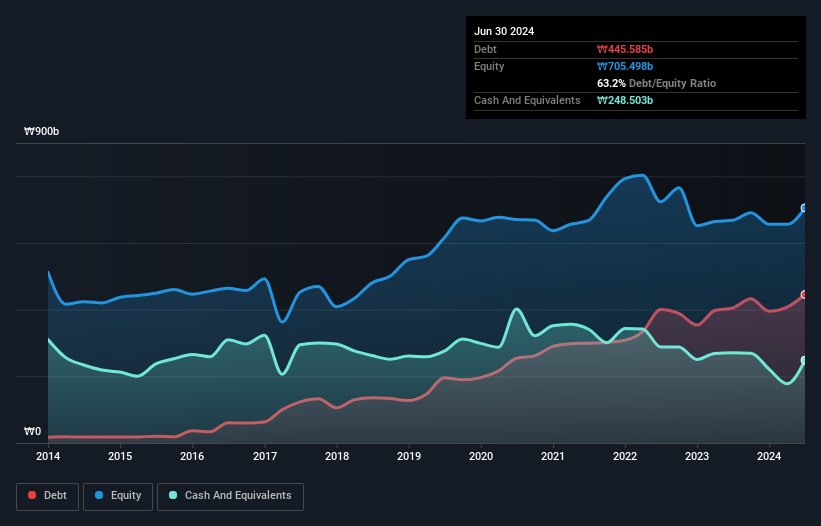Some say volatility, rather than debt, is the best way to think about risk as an investor, but Warren Buffett famously said that 'Volatility is far from synonymous with risk.' It's only natural to consider a company's balance sheet when you examine how risky it is, since debt is often involved when a business collapses. We note that Chabiotech Co.,Ltd. (KOSDAQ:085660) does have debt on its balance sheet. But the more important question is: how much risk is that debt creating?
Why Does Debt Bring Risk?
Debt and other liabilities become risky for a business when it cannot easily fulfill those obligations, either with free cash flow or by raising capital at an attractive price. If things get really bad, the lenders can take control of the business. However, a more common (but still painful) scenario is that it has to raise new equity capital at a low price, thus permanently diluting shareholders. By replacing dilution, though, debt can be an extremely good tool for businesses that need capital to invest in growth at high rates of return. When we think about a company's use of debt, we first look at cash and debt together.
View our latest analysis for ChabiotechLtd
What Is ChabiotechLtd's Net Debt?
The image below, which you can click on for greater detail, shows that at June 2024 ChabiotechLtd had debt of ₩445.6b, up from ₩405.1b in one year. However, it does have ₩248.5b in cash offsetting this, leading to net debt of about ₩197.1b.

A Look At ChabiotechLtd's Liabilities
The latest balance sheet data shows that ChabiotechLtd had liabilities of ₩831.6b due within a year, and liabilities of ₩353.4b falling due after that. Offsetting these obligations, it had cash of ₩248.5b as well as receivables valued at ₩276.0b due within 12 months. So its liabilities outweigh the sum of its cash and (near-term) receivables by ₩660.5b.
This is a mountain of leverage relative to its market capitalization of ₩869.5b. This suggests shareholders would be heavily diluted if the company needed to shore up its balance sheet in a hurry. When analysing debt levels, the balance sheet is the obvious place to start. But it is ChabiotechLtd's earnings that will influence how the balance sheet holds up in the future. So if you're keen to discover more about its earnings, it might be worth checking out this graph of its long term earnings trend.
Over 12 months, ChabiotechLtd reported revenue of ₩975b, which is a gain of 5.8%, although it did not report any earnings before interest and tax. That rate of growth is a bit slow for our taste, but it takes all types to make a world.
Caveat Emptor
Over the last twelve months ChabiotechLtd produced an earnings before interest and tax (EBIT) loss. Indeed, it lost ₩36b at the EBIT level. Considering that alongside the liabilities mentioned above does not give us much confidence that company should be using so much debt. So we think its balance sheet is a little strained, though not beyond repair. Another cause for caution is that is bled ₩99b in negative free cash flow over the last twelve months. So in short it's a really risky stock. There's no doubt that we learn most about debt from the balance sheet. But ultimately, every company can contain risks that exist outside of the balance sheet. For example, we've discovered 1 warning sign for ChabiotechLtd that you should be aware of before investing here.
At the end of the day, it's often better to focus on companies that are free from net debt. You can access our special list of such companies (all with a track record of profit growth). It's free.
New: AI Stock Screener & Alerts
Our new AI Stock Screener scans the market every day to uncover opportunities.
• Dividend Powerhouses (3%+ Yield)
• Undervalued Small Caps with Insider Buying
• High growth Tech and AI Companies
Or build your own from over 50 metrics.
Have feedback on this article? Concerned about the content? Get in touch with us directly. Alternatively, email editorial-team (at) simplywallst.com.
This article by Simply Wall St is general in nature. We provide commentary based on historical data and analyst forecasts only using an unbiased methodology and our articles are not intended to be financial advice. It does not constitute a recommendation to buy or sell any stock, and does not take account of your objectives, or your financial situation. We aim to bring you long-term focused analysis driven by fundamental data. Note that our analysis may not factor in the latest price-sensitive company announcements or qualitative material. Simply Wall St has no position in any stocks mentioned.
About KOSDAQ:A085660
ChabiotechLtd
A bio company, develops cell and gene therapy related to stem and immune cells in South Korea and internationally.
Mediocre balance sheet and slightly overvalued.
Market Insights
Community Narratives



